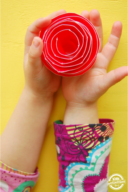As parents, we try our best to raise kind, respectful, and independent kids, and for the most part, we do a pretty ok job! All kids at some point in their lives try and push their parents’ buttons though (anyone ever had to deal with a tantrum-throwing 4-year-old in the very public aisles of Target? ).
This does not mean we have
bad kids or we did a bad job as parents. Cut yourself (and your kiddos!) some slack!! We’ve all been there. As my kids are growing up, we’re preparing for those “dreaded” teenage years… I’m here to tell you that those teenage years don’t HAVE to be dreaded! In fact, these years have been some of my favorites.

Teenagers are just trying to find their place in their little corner of the world, you may just have to alter your mindset a bit and try out some new behavioral techniques as they grow up!
Discipline techniques that may have been effective before are not likely to be successful as your kids transition to their teen years. Teenagers are at that important, yet tricky stage in the life of transitioning from child to adult. The in-between stage can cause trepidation and frustration at times, and as their hormone levels are changing, so can their moods and behavior.
Additionally, they are at a stage where they want to push their boundaries to feel grown up and independent. However, they still need guidance and parenting, as well as disciplining when necessary.
Here are some discipline tips to try out with your teens:

Pick your battles
Teens are at a fragile milestone where their hormones can take over. During their teen years, they can be fraught at times, which is why it is important to pick your battles. Constantly nagging devalues discipline, as teens learn to zone out. Nagging for every little reason is ineffective and only causes stress to all involved.
Deciding which behavior is just irritating and what needs to be corrected is important to be able to effectively discipline teens.
For example: for whatever reason, your teen finds that the appropriate place for their dirty soccer socks is right in the middle of their bedroom floor. You’ve asked a few times already, you’ve shown the laundry basket, etc.
Does this necessarily warrant a constant power struggle? Probably not. Buckling their seat belt when in the car? Now THAT is a battle I’m willing to fight.
Communication
It is important to keep the lines of communication open with teens, which is often easier said than done. Keeping a solid relationship and being able to communicate is essential to being able to keep the relationship healthy. Teens may act like they no longer need their parents, however, they are at a vulnerable stage in their life where they need support and guidance.
Having a good relationship can help to reduce negative behavior, as well as helping to understand their feelings. Find ways to strengthen your relationship to encourage better behavior: find a time to go for a weekly jog together, take a monthly trip around the mall, whatever you need to do to have some chit-chat time with your teen. It is important to stay connected!
Be true
The most effective form of discipline is to treat teenagers in the same way that you would any adult, with a level of respect and maturity. Old discipline methods can make them feel undermined and juvenile (ex: while a chore chart might work for a 10-year-old, it might have the opposite effect on a teenager).
Approaching a teen with a true and realistic manner can prove to be far more efficient in engaging them and getting a response from them. If they have misbehaved or broken the rules, show disapproval and voice concerns in a low tone with an assertive edge. Avoid having an “adult
temper tantrum” which is sure to just end with yelling and door slamming by both parties involved! By using a calm tone and expressing
why the rules and expectations are this way can make them realize what they have done wrong.
Positivity
Teens need positivity, encouragement, and praise to boost their spirits and raise their self-esteem. It is important to continue strengthening their confidence. Reinforcing good behavior in an appropriate way can have wonderful effects on their general behavior.
Giving acknowledgment and praise for their efforts and good behavior is a good way to deter negative behavior. Focus on the positives and good aspects, no matter how small – send them a text saying how much you appreciate them helping out by bringing their siblings to school, leave a note on their bed reminding them how proud you are of their good grades, etc.
Teens still need that acknowledgment and reinforcement to keep their spirits lifted. Giving attention when they are behaving accordingly and for their efforts is essential, as it encourages better behavior.
Discipline
When their behavior needs to be corrected or rules have been broken it is important to enforce discipline. Discipline should be kept for times when their behavior needs to be put in check, and it will be more meaningful and better results can be seen. Use a calm tone and be assertive to get the message across.
Refrain from nagging, and be straight to the point. Inform what they have done wrong, and how it has made you feel. Set consequences and be consistent. Limit the attention given, and refrain from engaging with them until they have reflected and thought about their wrongdoings. Again, avoid raising your voice and throwing an adult temper tantrum… they get you nowhere and often just escalate the problems.
Follow through
Once the air has settled and they realize what they have done, sit down to discuss their behavior. Spend a few minutes asking why they behaved in this way and what have they achieved. Explain the reasons for why the behavior is unacceptable. Set realistic consequences that relate to the misbehavior, and be consistent. Refrain from making remarks about them, rather their behavior (ex: instead of “You never make it home for curfew” say “I get worried something has happened to you when you choose to come home later than I’ve asked”).
Once they have accepted their wrongdoings move on. Don’t dwell on mistakes and bad behavior, as this can result in resentment. Trust that they’ll correct their behavior next time and give them the space to make right what they’ve done wrong. Constantly going on can make them more determined to behave badly.
Remember: discipline is teaching and guiding to help children learn how to behave appropriately, it is not a way to exert power over your kids. The teenage years can be tumultuous, but they can also be an amazing time to bond and create lifelong positive relationships with your kids!
 Teenagers are just trying to find their place in their little corner of the world, you may just have to alter your mindset a bit and try out some new behavioral techniques as they grow up!
Discipline techniques that may have been effective before are not likely to be successful as your kids transition to their teen years. Teenagers are at that important, yet tricky stage in the life of transitioning from child to adult. The in-between stage can cause trepidation and frustration at times, and as their hormone levels are changing, so can their moods and behavior.
Additionally, they are at a stage where they want to push their boundaries to feel grown up and independent. However, they still need guidance and parenting, as well as disciplining when necessary.
Teenagers are just trying to find their place in their little corner of the world, you may just have to alter your mindset a bit and try out some new behavioral techniques as they grow up!
Discipline techniques that may have been effective before are not likely to be successful as your kids transition to their teen years. Teenagers are at that important, yet tricky stage in the life of transitioning from child to adult. The in-between stage can cause trepidation and frustration at times, and as their hormone levels are changing, so can their moods and behavior.
Additionally, they are at a stage where they want to push their boundaries to feel grown up and independent. However, they still need guidance and parenting, as well as disciplining when necessary.






















Nice Blog and very useful that how can we teach discipline to our kids in very polite manner.Thanks for sharing.